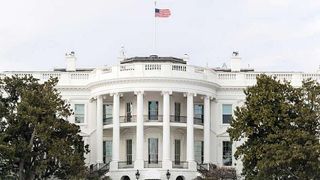Trump: Broadband Buildout Situation 'Intolerable'

President Donald Trump took issue with the speed of broadband buildouts to rural American and to anchor institutions Wednesday, calling it an "intolerable" situation, though suggesting as with many other things that it was a problem he had inherited.
In the President's Economic Report to the Congress released Wednesday (Feb. 21), he suggested the broadband ball had been dropped on prior watches.
"President Clinton promised to connect 'every classroom, every library, and every hospital in America,' to the Internet by 2000," he wrote. "Decades later, 39% of rural Americans still lack high-speed broadband. And a quarter of America’s K-12 students lack adequate Internet connectivity at school. It is intolerable to continue pretending that this is the best America can offer to our students. My Administration is working to expand accessibility and expedite the process of bringing the Internet to hard-to-reach areas."
The President has said rural, particularly farmers' access to broadband was key, and has proposed using $50 billion in federal funds for rural infrastructure, though without earmarking any of that specifically to broadband--he want to leave it up to states to decide how to prioritize the funds.
Related: Hill Bill Would Create National Broadband Access Standard
The President's report was released along with that of his Council of Economic Advisors. The latter's report spent a good bit of ink on broadband, pointing out that the lack of a business case for rural buildouts was a key factor in
"Private firms of today face many of the same basic problems that hindered infrastructure development to expand electrification and telephone service to rural areas during the early part of the last century: challenging geographical features and a lack of scale economies in regions with low population densities."
The council suggested that while there are options for government "intervention" in the marketplace, which they signaled should be minimized. Those include "loans and loan guarantees, infrastructure grants, universal service reform, tax incentives, direct assistance to taxpayers, and regulatory and deregulatory measures.
Broadcasting & Cable Newsletter
The smarter way to stay on top of broadcasting and cable industry. Sign up below
Related: Trump Signals $1.5 Trillion Infrastructure Plan
But perhaps one reason the Administration is not ready to earmark money for buildouts of "conventional infrastructure assets" is the rise of 5G and the ability to boost it by "shaping investment choices. "{I]t is important to proceed with an understanding of the availability of next-generation and mobile broadband technologies, because these may prove less costly and more desirable to consumers in the long run."
The council said that keys to that 5G rollout are standards and the regulatory environment. "Establishing a flexible and adaptive regulatory structure will be needed to support future 5G deployment, with coordination across Federal, State, and local government levels," it said, pointing to the FCC's April 2017 Notice of Proposed Rulemaking on removing barriers to broadband infrastructure.
Contributing editor John Eggerton has been an editor and/or writer on media regulation, legislation and policy for over four decades, including covering the FCC, FTC, Congress, the major media trade associations, and the federal courts. In addition to Multichannel News and Broadcasting + Cable, his work has appeared in Radio World, TV Technology, TV Fax, This Week in Consumer Electronics, Variety and the Encyclopedia Britannica.

